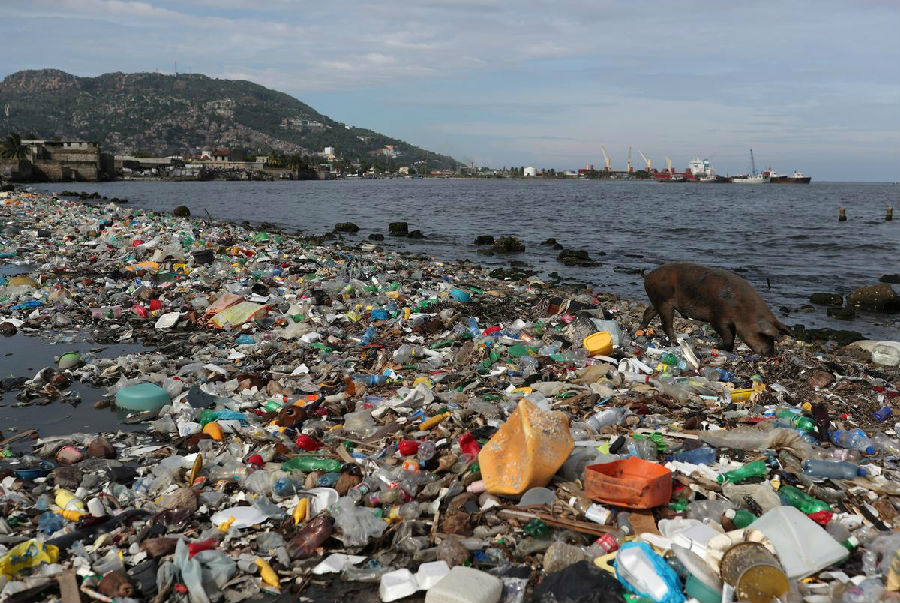(单词翻译:单击)
听力文本
Study: Plastic Pollution Flowing into Oceans to Triple by 2040
The amount of plastic waste flowing into the ocean could triple in 20 years unless businesses and governments act to reduce plastic production. That warning comes from a new study that appeared recently in the publication Science.
The study was carried out by scientists and industry experts for The Pew Charitable Trusts and SYSTEMIQ, an advising business. The study, called "Breaking the Plastic Wave," identified measures that could reduce plastic pollution that gets into the ocean by 80 percent.
If no action is taken, however, the amount of plastic going into the sea every year will rise from 11 million metric tons to 29 million metric tons by 2040, the study said.
"Plastic pollution is something that affects everyone. It's not a 'your problem and not my problem'. It's not one country's problem. It's everyone's problem," said Winnie Lau. She is a senior official at Pew and one of the lead writers of the study.
"It's going to get worse if we don't do anything," she added.
The report suggests redirecting hundreds of billions of dollars in plastic production investment into alternative materials. The report also calls for recycling centers and waste collection expansion in developing countries.
Such action would require a sharp change in how the energy industry does things. The industry has been building new chemical plants around the world to increase plastic output. This is happening as the industry's traditional fuel business has decreased because of a rise in cleaner energy sources.

The amount of plastic manufactured each year has been climbing since 1950 when 2 million metric tons were produced. By 2017, that number had risen to 348 million metric tons.
The study recommends that governments put in place laws to discourage new plastic production and provide more financial support for reusable alternatives.
The plastic industry has pushed back against government bans on single-use plastic products. Some of the biggest buyers of plastic are major companies like Coca-Cola, PepsiCo, Nestle and Unilever. These companies have all made promises to use a greater amount of recycled material in the future.
But current promises from businesses and governments will not reduce plastic enough. In fact, the Pew and SYSTEMIQ study found that current measures would only reduce the plastic flowing into the ocean by 7 percent by 2040.
To cut the flow of ocean plastic by 80 percent, the study said that paper or other materials that break down naturally must be used instead of single-use plastic. It also notes that packaging for products should be redesigned.
Some people have criticized the study for including burning, chemical recycling and plastic-to-fuel factories as ways to deal with plastic waste. Critics note that these methods involve the release of heat-trapping carbon gasses while also helping to continue with plastic production.
Single-use plastic products have become increasingly popular during the coronavirus crisis, the International Solid Waste Association has said. Face coverings and latex gloves are washing up each day on empty beaches in Asia. And landfills worldwide are filled with record amounts of food containers and delivery packaging.
I'm Ashley Thompson.
重点解析
重点讲解:
1. break down (使)(物质)分解;
The oil is attacked by naturally occurring microbes which break it down.
原油受到了自然产生的分解油类物质的微生物的侵蚀。
2. instead of 代替…;而不是…;
Instead of taking me to the departure lounge they took me right to my seat on the plane.
他们没有带我去候机厅,而是直接领我上飞机到了我的座位上。
3. deal with 处理;应付;与…打交道;
They claim the council has prejudiced their health by failing to deal with asbestos.
他们声称,理事会没有处理好石棉的问题,从而损害了他们的健康。
4. wash up 清洗;
I ran some hot water and washed up.
我放了一些热水把餐具洗了。
参考译文
研究表明到2040年流入海洋的塑料污染物将增加三倍
除非企业和政府采取行动减少塑料生产,否则20年后流入海洋的塑料垃圾量可能会增至三倍。这一警告来自最近发表在《科学》期刊上的一项新研究。
这项研究由皮尤慈善信托基金和咨询公司SYSTEMIQ联手科学家以及行业专家进行。该研究名为《打破塑料浪潮》,确定了可以将流入海洋的塑料污染减少80%的措施。
然而,研究表明,如果不采取行动,那到2040年,每年进入海洋的塑料量就将从1100万公吨上升到2900万公吨。
温妮·刘表示,“塑料污染影响每个人。这不只是你我的问题。也不只是一个国家的问题。而是所有人的问题。”她是皮尤慈善信托基金会高级官员,也是这项研究的首席作者之一。
她还表示,“如果我们什么都不做,那情况会变得更糟”。
研究报告建议将数千亿美元的塑料生产投资转向替代材料。报告还呼吁在发展中国家建立回收中心并扩大废物收集。
这类行动要求能源行业的运作方式做出重大调整。该行业一直在世界各地新建化工厂,以增加塑料产量。这发生在清洁能源的崛起导致该行业的传统燃料业务不断减少之际。
自1950年塑料产量达到200公吨以来,每年的塑料生产量都在不断攀升。到2017年,塑料产量已增加到3.48亿公吨。
这项研究建议各国政府制定法律,阻止新塑料的生产,同时为可重复使用的替代品提供更多财政支持。
塑料行业反对政府对一次性塑料产品施加的禁令。一些塑料最大买家是可口可乐、百事可乐、雀巢和联合利华等大公司。这些公司均承诺未来会增加可回收材料的使用量。
但企业和政府现在做出的承诺并不能充分减少塑料制品。事实上,皮尤和SYSTEMIQ公司的研究发现,现行措施到2040年只能使流入海洋的塑料数量减少7%。
研究表示,为了将流入海洋的塑料量减少80%,必须要使用可自然分解的纸张或其他材料,不能使用一次性塑料。研究还指出,产品包装应该重新设计。
一些人对该研究提出批评,称其将焚烧、化学回收和塑料转化为燃料工厂作为处理塑料垃圾的方法。批评者指出,这些方法会释放吸热的碳气体,同时也有助于继续生产塑料。
国际固体废物协会表示,在冠状病毒危机期间,一次性塑料产品越来越受欢迎。在亚洲空旷的海滩上,每天都有人在清洗面罩和乳胶手套。世界各地的垃圾填埋场堆满了创记录数量的食品容器和运输包装。
阿什利·汤普森报道。
译文为可可英语翻译,未经授权请勿转载!


